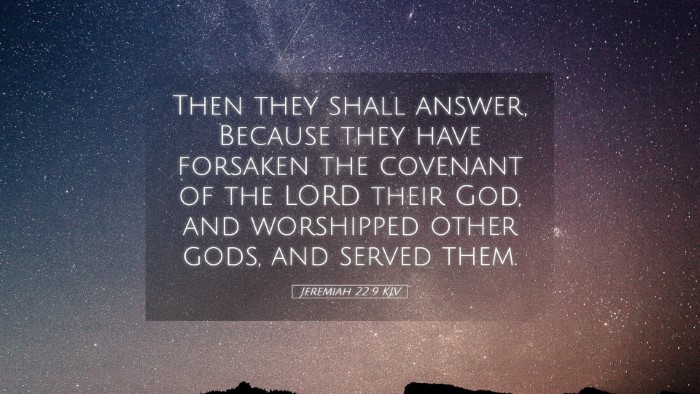Commentary on Jeremiah 22:9
Jeremiah 22:9 states:
"Then they shall answer, 'Because they have forsaken the covenant of the Lord their God and worshiped other gods and served them.'" (ESV)
Historical Context
This verse is situated during a critical period in Judah's history, shortly before the imminent Babylonian exile. The prophetic ministry of Jeremiah unfolds against the backdrop of political upheaval and moral decay prevalent within the nation. The kings of Judah had turned away from the covenantal relationship established with God, which led to both spiritual and social ramifications.
Thematic Analysis
At its core, this verse encapsulates several key themes:
- Covenant Faithfulness: The lamentation of the people highlights the significance of the covenant established between God and Israel, which included stipulations and commitments that were to govern their lives.
- Idolatry: The worship of foreign gods indicates a violation of the first commandment, showcasing the people's unfaithfulness and the consequences of turning to idols.
- Sovereignty of God: The impending judgment illustrates the sovereignty of God over nations and His ability to raise and bring down kingdoms according to His divine will.
Insights from Commentators
Matthew Henry's Commentary
Matthew Henry expounds upon the gravity of forsaking the covenant, emphasizing that the Israelites' shift towards idolatry represents a failure to recognize God’s sovereignty. He notes that their abandonment of the Lord was not merely a personal failing but a communal betrayal that warranted divine judgment. He stresses that the consequence of this apostasy would not merely be the loss of land but also the alienation from God, which is inherently destructive.
Albert Barnes' Notes on the Bible
Barnes reflects on the callousness of Judah's leaders and citizens who had forsaken the covenant due to their infatuation with materialism and foreign alliances. He comments on the prophetic voice of Jeremiah serving as a warning to the people about the repercussions of their actions. The phrase "they shall answer" indicates that there will come a time when the people will have to acknowledge their sins, thereby affirming God’s righteous judgments.
Adam Clarke's Commentary
Clarke elaborates on the covenant's importance, highlighting that it was not merely an agreement but a deep, relational commitment. To forsake it meant to disregard the very essence of their identity as God's chosen people. He remarks that the mention of worshiping other gods is indicative of a broader rebellion against God’s authority, which manifests in social injustice, moral failures, and spiritual blindness. Clarke urges readers to reflect on the implications of turning away from God in their own contexts.
Theological Implications
The verse raises pertinent theological discussions for pastors and theologians alike:
- The Nature of God’s Covenant: An exploration of the implications of covenant theology, revealing how faithfulness to God must be central in a believer's life.
- The Role of Idolatry: Understanding the contemporary forms of idolatry and their relevance in modern society, challenging readers to evaluate their own allegiances.
- Divine Judgment and Grace: This verse simultaneously affirms God's justice and the hope of redemption, prompting discussions on how believers today can respond to calls for repentance.
Practical Applications
For modern readers, Jeremiah 22:9 offers profound lessons:
- Self-Examination: Individuals are encouraged to assess their own fidelity to God, examining areas where they may have compromised their faith.
- Corporate Responsibility: Communities are challenged to hold one another accountable in faithfulness to the Lord, recognizing the collective nature of covenant fidelity.
- Proclamation of Truth: Pastors and leaders are called to be vocal about the dangers of idolatry, advocating for a return to Scripture as the foundation for life and practice.
Conclusion
Jeremiah 22:9 serves as a poignant reminder of the perilous consequences of forsaking one’s covenant with God. The insights drawn from Matthew Henry, Albert Barnes, and Adam Clarke underscore the grave implications of turning away from divine guidance. As the church navigates through contemporary challenges, let this verse be a rallying cry for faithfulness, urging an unwavering commitment to the covenant relationship established through Christ.


